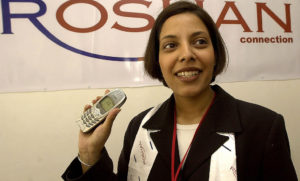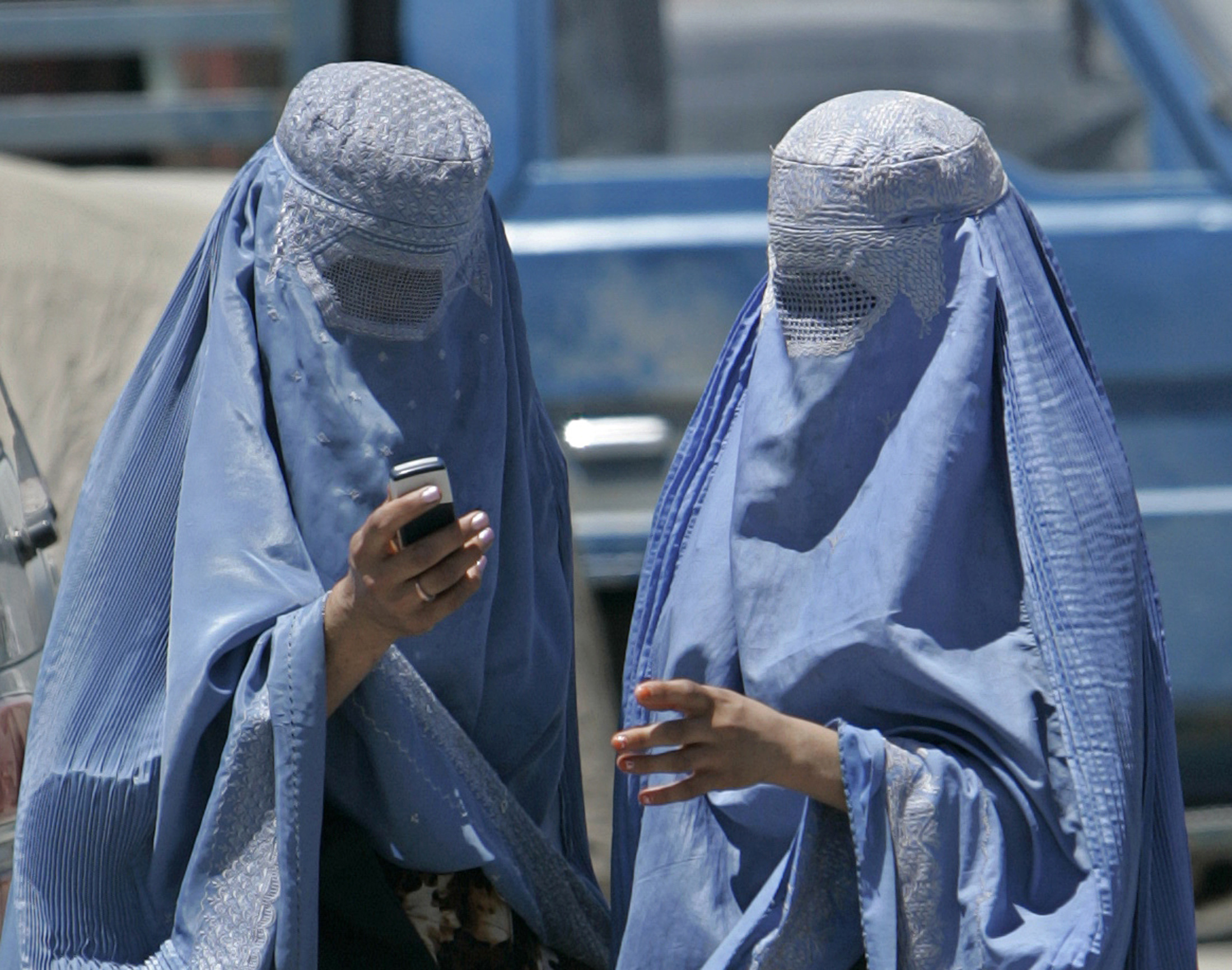Canadian Business
by Levon Sevunts | In Kabul
2005-08-15

Karim Khoja knew that operating a wireless phone company in Afghanistan would require negotiating some tricky political, business and cultural minefields. But he wasn’t counting on finding himself in the middle of a real one. Soon after arriving here from Vancouver three years ago, Khoja, the Canadian CEO of Roshan, Afghanistan’s largest telecommunications company, learned the meaning of the ubiquitous red and white painted rocks.
“I was driving from Kabul to Mazar,” recalls Khoja. “We had gone through the Salang tunnel and our driver stopped so we could have a nature break. And you know, you don’t think about it, right? You just came from Vancouver and you step out of the car, and you walk down the little slope, and you’re standing there [relieving yourself], and you see all these red rocks. How dangerous is that? Seven more steps and I could have been dead.” Red rocks mark adjacent minefields, Khoja would learn. White rocks mark the safe side.
Afghanistan–at the time under attack by insurgents from the ousted Taliban regime–proved a unique challenge for the Harvard-trained executive, whose resumé includes setting up pioneering cellphone networks in Pakistan, Poland and Croatia.
“I was shit-scared, to be honest,” Khoja says with a laugh as he remembers his first days in the volatile country. “I was the CEO of Hrvatska Telekomunikacije, I had this fancy office in downtown Zagreb, I had a driver, I had a nice life–and then I came to Afghanistan.”
Life in post-Taliban Afghanistan meant the constant threat of kidnappings and bombings, having armed guards around all the time, driving in unmarked minivans to keep a low profile and switching vehicles several times a day to avoid detection. Doing business also meant dealing with endemic corruption, drinking chai and smoking a sheesha (water pipe) with warlords, encouraging reluctant suppliers and setting up a 21st-century technology in a country lacking basic infrastructure and, in many ways, still stuck in the Middle Ages.
Initially, Khoja was doing all this for free: no fat executive paycheque and no stock options, at least not in the first year.
Born into a family of South Asian immigrants in Pretoria, South Africa, Khoja, 46, is a devout follower of the Ismaili branch of Shia Islam. Led by the Aga Khan, its hereditary spiritual leader, the Ismaili community has set up a veritable development empire in more than a dozen countries in South and Central Asia and sub-Saharan Africa. Roshan’s main shareholder is the Aga Khan Fund for Economic Development. AKFED owns 51% of Roshan, Monaco Telecom International owns 37.75% and MCT Corp., a U.S.-based telecom, owns the remaining 11.25%.
Khoja, who immigrated to Canada in 1985 and later became chairman and CEO of Richmond, B.C.-based eXI Wireless Inc., says he started doing volunteer work with the Aga Khan Development Network about five years ago. At the time, the humanitarian, social development organization was bidding for a telephone contract in Kenya, and since Khoja had a lot of experience in the area, he offered to help.
“Then they asked me to do some work in Tajikistan,” he says.
In 2002, he was asked if he could advise the Afghan government on telecommunications. After consultations with Afghan officials, Khoja identified a very interesting business opportunity and asked to be released from his advisory role to participate in the bidding process. Roshan won the bid in September 2002 and was awarded a GSM (for “global system for mobile communication”) licence in January 2003.
Starting a company in Afghanistan proved a logistical nightmare.
“The problem was space and facilities,” says Khoja. “Two years ago, trying to get our facility was difficult, trying to get building materials was difficult, trying to get bricklayers was difficult.”
Another problem was finding high-tech equipment suppliers. “Even today a lot of American companies won’t send their people here because they’re not covered by insurance,” explains Khoja. “But after a while they began to realize that we are a credible company, that we are very serious about this business, and they realized that they will lose the business. They come now and supply to us and they are very happy they did so.”
On July 27, 2003, Roshan finally launched its network in Kabul. Its licence obligation was to be in the top six cities– Kabul, Herat, Mazar-e Sharif, Qonduz, Jalalabad and Kandahar–by Jan. 9, 2004. Altaf Ladak, Roshan’s chief marketing officer and also a western-educated Ismaili, said the launch of the service in Kandahar was delayed by a few months because of security issues.
“Since then, we have expanded the network into 30 major towns and cities,” Ladak says. “We also have coverage in all the border cities in Pakistan, Iran, Tajikistan and Uzbekistan.”
Building the network infrastructure wasn’t easy, even in the parts of the country where insurgency is not a concern.
“Kabul is not Afghanistan,” Khoja says. “When you go outside of Kabul, you realize that there are very different ethnic groups, there are very different cultures that you have to respect. And you can’t just go in and start building a [cell] tower in a city: in the south, the Pashtuns would have their wives at home and they don’t like you building a tower and looking into their houses.”
So first Roshan had to send scouting teams.
“You go to the village, you meet with the warlord, you meet with the governor, you meet with business leaders, you meet with the leaders of the community, and you explain what it’s going to do for their town or their city,” Khoja says. “We sit down, we drink chai, smoke some pipe and talk to the elders, explain that we’re going to bring jobs, that we’re going to bring communications to your city, and this is what it’s going to take.”
To date, Roshan has invested more than US$150 million in the infrastructure and the network.
“This is much more than we initially put together in our business plan,” Ladak admits. “But then, the size of our customer base has also grown, so we’ve expanded much faster than anticipated. We’ve spent more money in two years than we were expecting to spend in 10 years.”
There is a huge demand for wireless services in Afghanistan, which never had an adequate fixed-line telephone system.
“At the end of 2004, it was 500,000 people using mobile phones,” says Ladak. But now Roshan alone has more than half a million customers, representing between 55% and 60% of the market share, and predicts the total market will grow to one million users by year’s end. Its sole competitor is the Afghan Wireless Communication Co., owned by New Jersey-based Telephone Systems International.
In a land with no banking system to speak of, no postal service to use for billing, not even street names and numbers in most of the country, Roshan has opted for a pay-as-you-go model, using scratch cards that are sold at almost every intersection and street corner. Customers buy only the phone and the smart card, and then fill the phone with call time as needed. The scratch cards, which are sold nationally through two distributors, come in denominations of US$5, $10, $20, $50 and $100.
But setting up world-class physical infrastructure that provides reliable service has been only part of Roshan’s success. The telco has also done some pioneering marketing research. And it started with choosing a name.
“We actually did 30 focus groups,” says Khoja. “We showed them a bottle of Coca-Cola and spent an hour explaining to them what a brand was. We said to them, ‘If there was a telephone company in this country, what name would you like?’ ”
Roshan, which means “light,” “new beginning” or “new dawn” in Dari and Pashto, Afghanistan’s two official languages, got the highest vote. The company also came up with a slogan, “Nazdik shodan” (“bringing you closer”).
Roshan maintains two flagship stores in Kabul and Herat, the ancient city near Iran. Designed and built to the highest western standards, Roshan’s flagship in Kabul would look like any Bell Mobility, Rogers or Fido outlet in a trendy Canadian mall if it wasn’t for the armed guards at the gate frisking every visitor.
“Security is an issue,” Ladak says. “If sometimes there is a network issue and we have to go and do some maintenance, depending on conditions, we may not be allowed there. So it adds to the complexity of running a network.”
Because there is no developed electricity grid in Afghanistan, Roshan also has to generate its own power. The company installs two generators for each cell tower it builds. “We are the largest private utility,” says Khoja.
Despite all these difficulties, Roshan is thriving. Company executives would not discuss financial performance, but they hinted that the telco is making a handsome return on investment proportional to the high risk of operating in Afghanistan. With about 500 full-time employees, about a quarter of them women, Roshan is also one of the biggest taxpayers in Afghanistan.
“It’s one of the greatest success stories in telecommunications in a developing country, in one of the least developed countries anywhere in the world,” says Christopher Alexander, Canada’s ambassador to Afghanistan. “When I arrived here in 2003, people were worried about phoning each other around the block. Today, my Roshan phone works in every country I go to around the world. And it works not only in cities in this country, but also in a lot of rural areas.”
A ringing endorsement.
